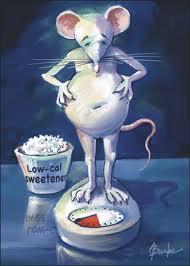
Researcher Susan E. Swithers has written in the journal Trends in Endocrinology and Metabolism an attention-getting editorial reviewing the mounting evidence that frequent diet-sugar consumers may also be at risk for all the hazards of excess sugar consumption: weight gain, metabolic syndrome, type 2 diabetes, and cardiovascular diseases. She reports not only the human studies, in which sugar substitutes are associated with all those disease, but also the science from animal studies in which rats receiving feed mixed with artificial sweeteners had greater weight gain, and other problems, than rats fed the same diets mixed with real sugar! It is presumed, and verified by some studies, that improper sweet signals from the non-caloric sweeteners disrupt normal feedback mechanisms. Eating saccharin, for instance, reduces the ability of the body to muster its normal responses to sweet-tasting foods.
"Artifical sweeteners appear to stimulate food intake by reducing the ability to compensate for energy provided by caloric sweeteners in the diet." No perceived sweetness, no normal energy balancing mechanisms set into action, so the saccharin eater keeps eating beyond the sugar eater.
What will be interesting to see is if these findings apply to stevia as well as chemical non-caloric sweeteners. The bottom line just might be to learn to find our satisfaction from less sweet foods, no matter how they are sweetened.
Pass that steak and salad plate, please.
